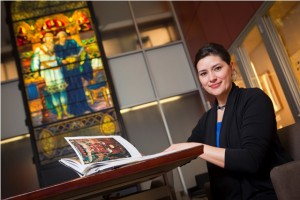
Professor Denise Galarza Sepúlveda
Even in 17th-century Spain, there were fashion police. While working on her current book project on an 18th-century Peruvian “clandestine history,” Professor Denise Galarza Sepúlveda discovered a manuscript that decries the scandalous new clothing styles popularized in the 17th century. Before now, no scholar has analyzed or published on the sermon.
Written by Franciscan priest Juan Augustín Ramírez, the three-part sermon is translated “Guide to Purity, and Eye-Opening Examples to Persuade Women to Wear Modest Clothing and Necklines, Drawn from Various Treatises by Different Authors Who Address This Topic at Length.” The sermon discusses the divine punishment and tortures that result from wearing provocative clothing, and more importantly, reveals the pressing moral concerns of society.
Galarza Sepúlveda, assistant professor of Spanish and chair of the Latin American and Caribbean Studies program, received the Paul W. McQuillen Memorial Fellowship and a Mellon Grant from the Academic Research Committee for her archival research at the John Carter Brown Library at Brown University. The library is one of the most important archives in the U.S. for the study of the Latin American colonial period. In September, she presented her findings at the 10th Biennial Conference of the Group for the Study of Women in Spain and the Americas, pre-1800 hosted by Mt. Holyoke College and University of Massachusetts, Amherst.
“One of the reasons this sermon is particularly interesting is the transatlantic circumstances of its production – it was written and published in 1687 in Spain and republished over a half century later in Lima, Peru,” she explains. “I examined the text written by the bishop of Lima on the occasion of the sermon’s republication, which offers insight into the perceived moral crisis in 18th-century Lima. It differs in substantive ways from the urgencies that prompted the initial Spanish publication. I also found that despite having fallen into obscurity for centuries and having been left unstudied until now, Ramirez’s text was widely quoted by his contemporaries. It was most often cited in moral treatises that centered on the dangers inherent in everyday dealings with women. This suggests an increased presence of women in Barcelona and Lima’s public spaces and is indicative of the attendant moralistic anxiety.”
This past summer, Richard Durham ’11 (Braintree, Mass.), a double major in economics & business and Spanish, worked with Galarza Sepúlveda as an EXCEL Scholar to identify opaque references in the sermon connected to historical figures and events and place them in historical context. Durham, who plans to work with community-driven development projects before moving on to graduate school, says his research taught him a great deal about the world today.
“This has highlighted for me the significance of historical and cultural events in shaping a society’s values,” says Durham, who is now studying testimonial literature of Luis Gonzalez de Alba, an influential college student imprisoned during the Mexico City student massacre in 1968, with Juan Rojo, assistant professor of Spanish. “It’s always beneficial to be involved with a project that’s heavily Spanish-language oriented. Besides being very down to earth, Professor Galarza Sepúlveda has been fundamental in my development as a Spanish speaker and my learning of the Spanish-speaking world.”
Galarza Sepúlveda was impressed with Durham’s work. The collaboration helped her create new ways to incorporate her research into the classroom, particularly her Tradition and Transgression course, a survey of colonial Latin American literature.
“Richard has native fluency in Spanish, an interest in historical research, and a keen eye for literary analysis,” she says. “The groundwork that Richard helped me complete enriched the way I introduce this work to my students. My research keeps me engaged in my field and allows me to bring these important manuscripts to light in the classroom.”
